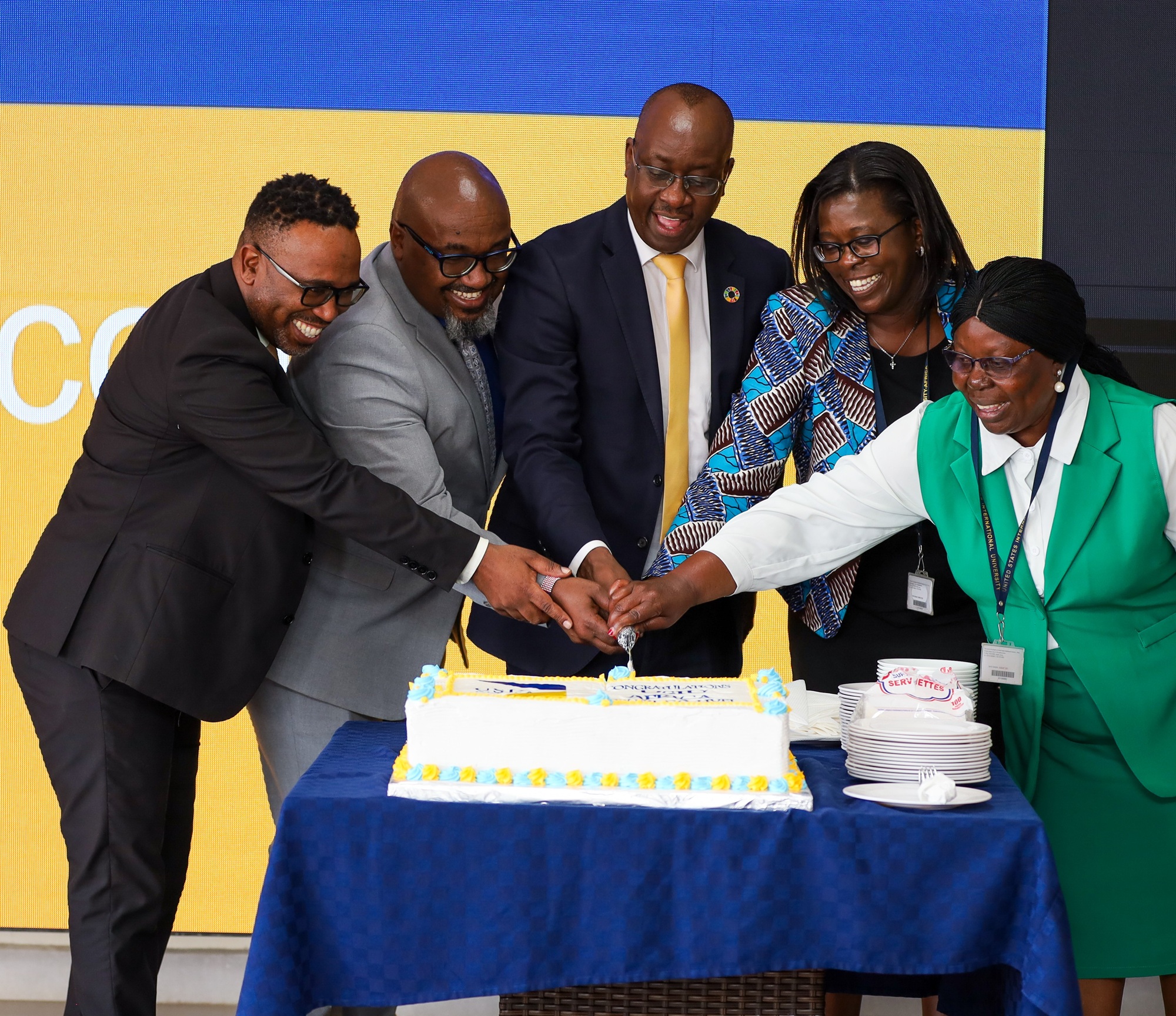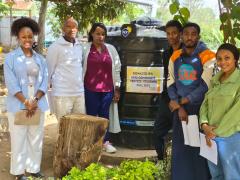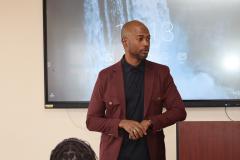VCs Weekly Higher Education Digest: April 29, 2019
Kenya short of ‘impossible’ target for all lecturers to get PhDs By Anna McKie TIMES HIGHER EDUCATION
Kenyan universities are heading for a crisis as they look increasingly unlikely to hit a target for all lecturers to have a doctorate by this autumn. A report from the country’s Commission for University Education says that, according to latest data, just 32 per cent of academic staff possess a PhD. A 2014 directive issued by the commission, the government’s higher education regulator, said that lecturers without a PhD by its deadline – originally November 2018, now pushed back to October 2019 – would not be able to continue in their jobs.
https://www.timeshighereducation.com/news/kenya-short-impossible-target-all-lecturers-get-phds
Creating inclusive curricula in higher education By Patrick Blessinger, Enakshi Sengupta and Mandla Makhanya WORLD UNIVERSITY NEWS
The ongoing development, growth and stability of modern economic and democratic systems require that people engage in continual education and training throughout the course of their lives – that is, lifelong and lifewide learning. As a result of this contemporary reality, higher education systems around the world, including both formal and non-formal types of learning, have experienced unprecedented change in the past few decades in the areas of democratization, internationalization and treating lifelong learning as a human right.
https://www.universityworldnews.com/post.php?story=20190422070841869
The Fall, and Rise, of Reading By Stephen Johnson THE CHRONICLE OF HIGHER EDUCATION
Almost all professors, 97 percent, think it’s “important” or “very important” that students come to class having completed their reading, according to the 2018 Faculty Survey of Student Engagement. But just 3 percent think that students actually do all of their reading…. The average college student in the United States spends six to seven hours a week on assigned reading, according to the National Survey of Student Engagement (which started tracking the statistic in 2013). Other countries report similarly low numbers.
https://www.chronicle.com/interactives/20190419-Fall-of-Reading
The Future of Gen Ed By Colleen Flaherty INSIDE HIGHER EDUCATION
General education is not simply filler for a student’s time in college beyond the major. Done well, gen ed can answer students’ questions about what college is, and why it matters…. Yet general education is under threat. Politicians question the value of it, specifically requirements that aren’t explicitly job oriented. Students don’t always get it. And creating and adopting a strong general education program demands much of already time- if not resource-strapped professors and their institutions. Is gen ed worth the fight?
The universities scoring highest for gender equality By Ellie Bothwell TIMES HIGHER EDUCATION
A diverse range of universities spanning Europe and Oceania are leading the way when it comes to gender equality, according to the latest Times Higher Education data…. The ranking measures universities’ research on the study of gender, their policies on gender equality and their commitment to recruiting and promoting women.
https://www.timeshighereducation.com/news/universities-scoring-highest-gender-equality
Could student mental health apps be doing more harm than good? By Anna McKie TIMES HIGHER EDUCATION
Student mental health: there’s an app for that. But might such tools do more harm than good? As concern about the well-being of students grows, and as waiting lists for counselling and support expand, university websites increasingly direct students – and, in some cases, staff – to online support resources, which include a number of apps, among them Headspace and Calm…. However, academics have warned that many such apps are based on limited scientific evidence.
https://www.timeshighereducation.com/news/could-student-mental-health-apps-be-doing-more-harm-good
Essay mills aim to help students dodge plagiarism checkers By Anna McKie THE CHRONICLE OF HIGHER EDUCATION
Essay-writing services are launching new resources for students, such as tools to help “paraphrase” sentences and beat plagiarism checkers, in an attempt to stand out in an increasingly crowded market. Edubirdie, an essay-writing service that paid hundreds of YouTube stars to promote its services, has created a paraphrasing tool in what it described as a bid to become a “one-stop shop” that helps students complete their work so they can “enjoy life”.
https://www.timeshighereducation.com/news/essay-mills-aim-help-students-dodge-plagiarism-checkers
‘Academic writers’ set to lose lucrative global market By Gilbert Nakweya WORLD UNIVERSITY NEWS
Recent measures taken by the United Kingdom government to stamp out the use of essay mills by its students come as a blow to thousands of Kenyan university students and graduates who rely on contract academic writing as a major source of income. Kenya is an international “hotspot” of individuals enabling contract cheating, according to Dr Thomas Lancaster, an integrity expert and higher education professional at Imperial College London. A hotspot is an international location with essay mill companies and individual writers keen to make money by helping other people to cheat.
https://www.universityworldnews.com/post.php?story=20190416085024565
African governments need to fund research ethics training By Paul Ndebele WORLD UNIVERSITY NEWS
There has been significant growth in international collaborative research implemented in Sub-Saharan Africa over the past three decades – funded mainly by the United States, United Kingdom, Germany, Japan and other nations. This growth has in part led to debates about the ethics of some of the research…. Some commentators accused researchers from rich countries of using poor African countries to conduct research which they could not conduct in their own countries due to the stringent protections already in place. Additionally, several papers described the weak research oversight systems in several African countries.
https://www.universityworldnews.com/post.php?story=2019041516051932
Research must solve social problems, says top EU policymaker By David Matthews TIMES HIGHER EDUCATION
One of the European Union’s top policymakers has warned universities that the bloc’s research priority is now tackling current-day economic and environmental challenges rather than funding curiosity-driven enquiry…. To the concern of some universities, plans have tilted away from curiosity-driven research towards backing ideas that aim to create immediate real-world impact, like a new European Innovation Council, which Brussels hopes will give European start-ups the financial muscle to compete with US and Chinese rivals.
Raising the visibility of African research and innovation By Tawana Kupe WORLD UNIVERSITY NEWS
In 2018 the bottom rung of the Global Innovation Index rankings published by the World Intellectual Property Organization prominently featured countries from the Global South. This bottom rung was further dominated by African nations, with the rankings suggesting that the innovation leaders for low income (of under US$1,005) countries are Tanzania, Rwanda and Senegal…. If research is not visible, it is not used or cited. If it is not cited, it never makes the cut in the high impact index list which is largely based on citations. This is a vicious cycle which forever holds African (and Global South) researchers and universities to ransom.
https://www.universityworldnews.com/post.php?story=20190408135104594
Being a Black Academic in America THE CHRONICLE OF HIGHER EDUCATION
The “Operation Varsity Blues” bribery scandal led to an outpouring of conversation on privilege, merit, and fairness in higher education. African-American scholars were quick to point out the hypocrisy the scandal revealed. As Anthony Abraham Jack… put it, “I have been told by people at times, ‘You stole a spot because you’re here.’ Now, who stole what from who?” In the wake of the scandal, The Chronicle Review asked graduate students, junior professors, and senior scholars what it’s like to be an African-American academic today.
https://www.chronicle.com/interactives/20190418-black-academic
Georgetown slavery reparations plan spotlights institutions’ failings By Paul Basken TIMES HIGHER EDUCATION
A bid by Georgetown University students to pay reparations to the descendants of slaves sold by their institution is threatening hard ethical assessments across much of US higher education, according to some experts. The students’ proposal instead would create a new $27.20 (£20.83) per-semester student fee to benefit thousands of descendants of the 272 slaves who were sold in 1838 – for about $3.3 million in today’s monetary value – to save Georgetown from a financial crisis.
Students Fall for Misinformation Online. Is Teaching Them to Read Like Fact Checkers the Solution? By Beckie Supiano THE CHRONICLE OF HIGHER EDUCATION
Traditional-age students are digital natives. Professors are trained researchers. Neither of those qualities, though, prevents people from falling for misinformation online. That’s one finding from a memorable study, released as a working paper in 2017…. The students and historians followed many of the tips that students are usually given for conducting online research, like examining a site’s domain name. But the tactics didn’t work.
https://www.chronicle.com/article/Students-Fall-for/246190
Teaching intelligence: digital literacy in the ‘alternative facts’ era By Anna McKie TIMES HIGHER EDUCATION
The advent of the internet and social media has put a wealth of information – and other people’s opinions – at students’ fingertips. Twenty years ago, students would be expected to spend hours in the library digging through journals. While the internet has removed that obstacle to learning, more than just peer-reviewed articles can be found online. A special issue of the journal Teaching in Higher Education has focused on the contribution made by higher education to expertise and knowledge in the age of “alternative facts”.
Entrepreneurship is ‘21st-century heroism’, students told By David Matthews TIMES HIGHER EDUCATION
Universities are teaching their students to view entrepreneurship as a kind of “21st-century heroism”, according to a new Europe-wide analysis that uncovers how deeply some institutions have taken on a new role to promote “innovation” in the economy and wider society. This so-called third mission has sometimes been seen as suffering from neglect compared with the university’s traditional goals of teaching and research.
https://www.timeshighereducation.com/news/entrepreneurship-21st-century-heroism-students-told
Do Your Academic Programs Actually Develop ‘Employability’? There’s an Assessment for That By Goldie Blumenstyk THE CHRONICLE OF HIGHER EDUCATION
Lots of colleges claim that their academic programs prepare students for employment. A new organization known as the QA Commons says: Prove it. The idea is to evaluate whether individual courses of study develop the skills that employers increasingly say they want, the so-called soft skills like communication, adaptability, and problem solving…. QA Commons spent two years developing and testing a set of “essential employability qualities” and recently began offering to certify programs that meet its standards.
https://www.chronicle.com/article/Do-Your-Academic-Programs/246120
Teaching quality in US higher education is a myth By John Tagg TIMES HIGHER EDUCATION
US universities might be world-leading in research terms, but there is scant evidence that this has any bearing on their prowess as educators. Why do institutions of higher education show so little interest and aptitude in instilling genuine learning? I am not suggesting that college faculty do not care about what students learn. Of course they do. For most, the desire to advance learning is what drew them to the profession in the first place…. But college faculty, like everybody else, respond to incentives. And most of the incentives in their work are based not on student learning but on the instruction myth.
https://www.timeshighereducation.com/features/teaching-quality-us-higher-education-myth
College Leaders Are Getting Serious About Outsourcing. They Still Have Plenty of Concerns, Too. By Goldie Blumenstyk THE CHRONICLE OF HIGHER EDUCATION
Outsourcing at colleges ain't what it used to be. If you hear the term and think "dining services" or "bookstore," you're not wrong. But you'd be overlooking a range of other services that colleges increasingly eye as ripe for partnership with outside parties. Among them: managing online programs, predictive-analytics systems, skills training and boot camps, and even career counseling. https://www.chronicle.com/article/College-Leaders-Are-Getting/245978
Revenue From Online Ed Is On the Rise. So Is the Competition, Moody’s Says. By Terry Nguyen THE CHRONICLE OF HIGHER EDUCATION
As universities continue to cope with the long-term financial fallout of the Great Recession, many of them are increasingly turning to online programs to survive. That's one implication of a recent report by Moody’s Investors Service…. This trend of growth and investment in online education will lead to intensified competition and changing key players, the report says. For an industry previously dominated by for-profit institutions and a handful of private nonprofits, the landscape is shifting quickly.
https://www.chronicle.com/article/Revenue-From-Online-Ed-Is-On/246088
US public universities eye big move into online education By Paul Basken TIMES HIGHER EDUCATION
The whittling-down of the for-profit sector in US higher education is creating a lure – increasingly felt by bigger public institutions – to fill the void of online offerings catering to older career-oriented students. So far just a handful of non-profit institutions, both public and private, have made major leaps into online. But large public universities are now taking harder looks, experts said, and appear best positioned to make big gains.
https://www.timeshighereducation.com/news/us-public-universities-eye-big-move-online-education
‘Undue reliance’ on journal impact factor in academic evaluation By Nick Mayo TIMES HIGHER EDUCATION
At least one in three research-intensive universities in North America examined by a study leaned on the journal impact factor of periodicals that academics had published in when making decisions on promotion and tenure, but the true proportion may be much higher. The study, believed to be the first to examine the use of the journal impact factor in academic performance reviews, warns that there is an “undue reliance” on the controversial metric, which represents the number of times articles in particular publications have been cited in recent years.
https://www.timeshighereducation.com/news/undue-reliance-journal-impact-factor-academic-evaluation
Quality bodies urged to tackle higher education ‘corruption’ By Anna McKie TIMES HIGHER EDUCATION
A report that details “significant corruption” in higher education worldwide – including professors with fake doctoral degrees in Russia and officials at a Japanese university adjusting results to keep out female students – warns that quality bodies lack the mechanisms to uncover and root out corruption…. [The report] not only finds “significant corruption in higher education” but also that quality bodies around the world often lack the procedures necessary to unearth corruption.
https://www.timeshighereducation.com/news/quality-bodies-urged-tackle-higher-education-corruption






